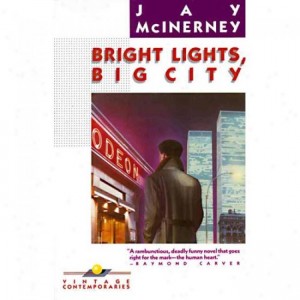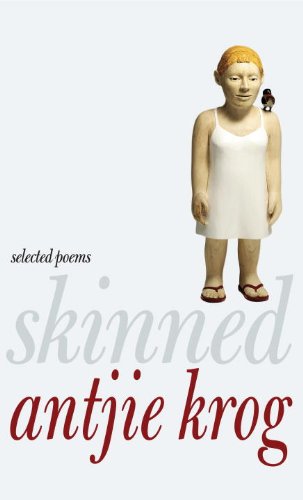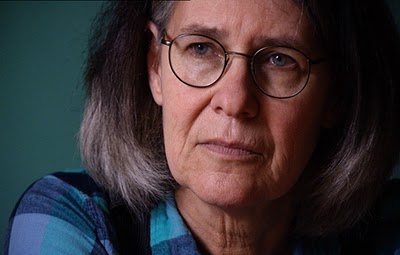“Besides: to learn to use her mind’s energy against itself, she would have to add new content. Even if it was content that might eventually ease the burden of having content, at this point, she is so overwhelmed with the content she already has, she thinks she cannot take on any new content even if it’s promised that the new content will help her.” — from Evelyn Hampton’s “The End of Content” over at The Collagist; no one does clever and sad at the same time like Evelyn Hampton
An Interview with Roy Kesey
Roy Kesey, whose most recent book is the collection of short stories Any Deadly Thing, recently spent some time talking with me about his writing. Kesey is also the author of Pacazo, one of my favorite novels of 2011, All Over, another collection, and Nothing in the World, a beautiful novella.
I suggest listening to/watching this thing up to the 40:30 point, at which point I would rather you closed the tab and forgot all about it. Our connection died at this point, but what it looked like from my perspective was Roy staring at me in utter bewilderment for several minutes straight, which was kind of awkward. I would edit it out and put a proper ending on it if i could! But I can’t.
Regardless, Roy says some very smart, useful stuff, and I had a great time talking to him. You should buy all his books.
Some Similarities Between Osama bin Laden and Arthur Rimbaud
There is a boy who has captured a considerable amount of my heed lately, and that boy is called Osama bin Laden (or, if you’re in the CIA, UBL). Obviously, I, along with the rest of the world, was aware of this boy for quite a while. But it wasn’t until one of the most disgusting days in recent history (that is, the day when the Supreme Court repealed formidable features of DOMA) that I began to discern the details of his origins; for, on that disgusting day, girl-boy Judith Butler told me that Osama, by residing in the Middle East, was surrounded by ungreivable lives — lives that could be erased and encroached upon without any kind of fuss because they already “inhabit a lost and destroyed zone.”
The devil-may-care attitude affixed to Osama’s homeland and peoples made him murderously upset. After some further investigation, I found that Osama’s consternation correlated to that of Arthur Rimbaud’s. In the late 19th century, Arthur declared war on the Western world with his poem “What Do We Care, My Heart.” He wanted America to “vanish!” He screamed: “Power, Justice, History, fall!” A century later, Osama, too, declared war against the advance, civilized nations, telling them (though, really, just America): “You are not unaware of the injustice, repression, and aggression that have befallen Muslims through the alliance of Jews, Christians, and their agents, so much so that Muslims blood has become the cheapest blood and their money and wealth are plundered by enemies.”
Uh-huh, both of these boys have bellicose bones to pick with, what Judith Butler describes as, secular modern states. The traits these countries confer upon their subjects — ones that make their lives grievable — violently appall Arthur and Osama, as Arthur and Osama exhibit an affinity for behaviors that don’t comply with those of normative Western humans. What follows are a few of the ways in which both Arthur and Osama contrast with humans from democratic, Capitalistic societies.
READ MORE >
25 Points: Room
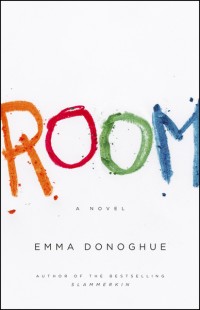 Room
Room
by Emma Donoghue
Little, Brown, 2012
384 pages / $7.99 buy from Amazon
1. Not many authors could write believably from a child’s point of view and still provide such credibility and license to the narrator. That’s what you need to know most readily to begin this book.
2. Concepts like “TV People” and rain being nothing more than a blurry veil over Skylight–a saddening slap in the face realization for readers that this is really happening.
3. It is striking, the “savant” nature of the little boy – how he can be so well-educated with so few resources, and yet so ill-informed on social protocol and other “real world” mechanisms. It could be argued, though, that he is in many ways better off than a “normal” child.
4. This reviewer recommends reading this book aloud or obtaining an audio copy. Hearing the dialogue between the mother, the child, and Old Nick is especially gripping.
5. It is an incredible struggle not to be angry with Grandma. Grandma’s love for Ma exists but does not inspire.
6. The poem excerpt at the beginning. Yes.
7. The way the child refers to inanimate nouns as personified, proper-nouned entities provides reality to the voice of the child narrator, but also speaks to the attachment any human would have to inanimate things in a situation such as “Room” describes. It’s a very subtle way to calcify the experience for readers.
8. Page 67, “Princess Diana” “Should have worn her seat belt” — one of the funniest sidesteps in conversation throughout the novel, albeit cryptic.
9. The experience of the Indian family and their dog finding Jack in the park elicits severe, literal nausea. For the first time, picturing Jack outside of Room and experiencing what he must look like up next to other humans, other children – pure nausea.
10. There is a distinct failure to understand that radiates through the hospital. As such, the reader will experience a certain kind of rage and a certain kind of advocacy for Ma and Jack. On Donoghue’s merit, this is a great mechanism for roping readers in more tightly, On the other hand, the injustice provokes readers to consider how often and to what degree these situations are marred by “professionals” in our nonfiction world. READ MORE >
August 15th, 2013 / 12:06 pm
SEVEN BOOKS I HAVE ACQUIRED THROUGH CASUAL SEX
Recently, [1] I grabbed dinner with a friend of mine from when I worked in the financial services industry. To me, that seems like a lifetime ago but it is actually equivalent to only a couple of–amazing!–years. His name is Kevin and we mostly talked about books we like and why we like them as we shared dinner at an overhyped restaurant in the LES, called “Mission Chinese.” [2]
In this friend-session we also talked about the act of underlining in books, an act in which I engage in fiendishly and sometimes manically, as well as how the things we underline are topically representative of ourselves. The things that speak to us at a set moment in time usually encapsulate how we view the world at that point in our lives. [3]
Following dinner we walked around and it was pleasant. The weather was at the precise intersection of where one is warm enough to be horny and cold enough to crave cuddling. The last person I have been horny and cuddly with recently received an email including my question: ‘Do you happen to have my copy of Bright Lights, Big City?’ The inquiry remains unanswered, but it is highly likely I might have previously clarified I never want any answers–and certainly no questions–from that recipient. I am glad I gave this book, because whatever, there are always 50 copies of it at all the used bookstores I go to and it is almost as easily replaceable as the good Bret Easton Ellis ones. However, I don’t actually plan on replacing it anytime soon; I did enjoy reading it when I did but I am not feeling a void since realizing it has been gone.
The person I was when Kevin first got to know me is still a part of me, but when he knew me I was underlined very differently. For example, I used to go to a funny place that is no longer in existence, which we can call “Not The Beatrice.” I used to go there with a friend of mine I no longer remember, [4] and we used to spend a ridiculous amount of time (and money) in the bathrooms, because it was that era of our lives. During a winter night there was a beautiful girl that pointed at me and complimented my coat. Claire had an expensive eye–because my coat was Dior Homme and it was tailored to fit me expensively–but she also spoke British and asked to do coke. I had none, but others did and when “Not The Beatrice” closed much after the hour all other places closed we ended up in a Soho apartment that was way too nice and full of everything Claire could ever want. My nightlife friend kept falling asleep, but I was awake and so was Claire so then we let everyone sleep and did things mostly with our hands. [5]
Sidebrow is reading! Send in your manuscripts of prose, poetry, cross-genre, and collaborative work from now until Sept 15. Details here.
Skinned: An Interview With Antjie Krog
*****
One of South Africa’s foremost contemporary poets, Antjie Krog has been described as the “Pablo Neruda of Afrikaans.” I stumbled on Antjie Krog’s work several years ago and was rewarded with the strange, passionate, tough and well-organized verses of Body Bereft (which contains, among other work, her strange and fiery Menopausal Sonnets). So, I was excited when, earlier this year, a Selected poems of Antjie Krog, Skinned, released from Seven Stories Press.
*****
And here, then, is the transcript of an email interview I did with South African poet Antjie Krog that touches on those Menopausal Sonnets, South African Politics, Afrikaans, Indigenous Literature Translations, etc, etc:
*****
Rauan: Many of the readers of this blog will be drawn to “Menopausal Sonnets” and other examples of frank, fiery and often crude writings about the changing (and failing) female body. In your Author’s Note you mention that “Skinned” contains “traces” of certain foreign writers, including Sharon Olds and Carolyn Forché. And it seems to me, besides, that you are naturally a fiery, direct and spicy personality. (How right and/or wrong am I?)
And can you elaborate on what, inside and outside, brought you to write such direct and sometimes graphic poems containing bits like
…you grab this death like a runt and plough its nose
right through your fleeced and drybaked cunt.
and
……the waist thickens and
the vagina wall thins and the colon crashes
through its own arse. how dare her toe
nails grow so riotous then…
Antjie: Poetry has taught me how to live. Everything of value I have found there. For me it therefore ought to be able to encompass one’s whole life. I am very aware what male poets have decided the Main Themes of Literature should be: Love, Death, God, Nature and War. This is fine, but it should also say menstruation, menopause and grandmother, READ MORE >
Reading what’s extraneous
Last week at Big Other, Paul Kincaid put up a brief but intriguing post in which he asks to what extent various factors surrounding a text influence the way we think about it or its author. He gives the following example:
The program I use for databasing my library pulls down information from a wide variety of sources ranging from the British Library and the Library of Congress to Amazon. More often than not, this can produce some very strange results. I have, for instance, seen novels by Iain Banks categorized as ‘Food and Health’, and novels by Ursula K. Le Guin categorized as ‘Business’. In all probability, these are just slips by somebody bored, though you do wonder what it was about the books per se that led to such curious mistakes.
Paul’s musings raise many interesting questions. For one thing, we might wonder whether the factors he’s describing are indeed extraneous or external to texts. Because I can imagine a good post-structuralist immediately objecting that texts more porous than that, and that it’s all just a sea of endless texts slipping fluidly into one another.
Me, I don’t have a problem with treating texts as discrete and coherent entities, but I admit the situation is complicated.
Every day that I don’t give up writing completely feels amazing

I’m not one of those people who feels the need to write all the time, as you may have guessed, from reading my other shit on this website.
I frequently turn over the possibility of permanently ceasing all writing outside of my job. It’s not unusual. I think other contributors have mentioned this impulse. I’ve considered announcing this in some kind of horrifically boring final post. It’s obviously not a palatable idea, because who gives a shit? Certainly not someone similar myself, the self-audience, who is probably too lazy to every submit a single piece of writing to micro-press, let alone establish a relationship with an agent or editor. It doesn’t fit with the frozen vibe. I don’t fear rejection at all. I fear wasting people’s time. I fear over-sharing. I fear talking to an empty room.
Th end of publishing is kind of like a party thrown by a really unpopular kid.
25 Points: Petrarchan
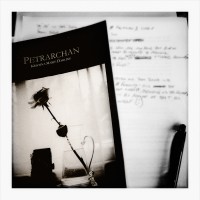 Petrarchan
Petrarchan
by Kristina Marie Darling
BlazeVOX [books], 2013
72 pages / $16.00 buy from BlazeVOX or Amazon
“Within every box, I found only compartment after compartment.”
1. Petrarchan is Kristina Marie Darling’s 8th book, published by the ever controversial Blaze Vox Books. (Yikes. Remember that whole thing? I still have love for the Vox, though.)
2. Much in the way she “took liberties with H. D.’s letters” in THE BODY IS A LITTLE GILDED CAGE, Darling uses ekphrasis, careful appropriation, erasure, and the work of Petrarch and Sappho (the latter, via Anne Carson’s translations) to achieve her grand illusion.
3. Kristina Marie Darling’s voice as a writer is unmistakable and unshaken regardless of mode or form. Of this, I am thoroughly convinced.
4. In fact, one thing that has repeatedly struck me about Kristina is how much larger in stature her writing voice is than its author. To be clear, this is not to reduce her as a person, but to exemplify her work as a force. Often, in an effort to amplify one’s voice over the din of modern media, the artist must become a personality first in order to gain potential interest in the work. Unfortunately, it becomes easy for the latter to suffer in the shadow of the former in the race. Darling reminds me that there is still a strong argument to be made as an artist for placing one’s ambitions squarely on the body of one’s art.
5. This is to say that I have no idea whose parties she attends, under which influences, et cetera, but I damn sure know when it’s her voice there on the page.
6. The reader will find in Petrarchan Darling’s familiar signature use of spare narrative and spectral imagery driving a carefully plotted course of marginalia and footnotes. To be fair, it is doubtful that anyone who is unconvinced or maybe even still undecided about her work in general will be swayed by Petrarchan. However, those of us who are believers or even simply interested parties will take comfort in knowing that what is gold still shines.
7. Tangentially, I have been thinking a lot about appropriation and erasure lately. As a writer who uses both at times almost criminally, I think a lot about what constitutes successful employment. After all, as some will invariably argue, can’t anyone do it? The short answer, of course, is yes. But to make a piece of erasure or other appropriation both successful and original despite its sources, I believe what the author chooses not to use, and why, becomes equal in importance to what is used, and how. The author must rely on the source text to some degree, but the artistic voice of the finished piece should stand on its own. Darling’s work—and Petrarchan is no exception—is as fine an example as any to underline these values.
8. I am thinking about corridors—hands and bricks or wood and the long-form sound of feet moving to some god knows where. I think about corridors a lot I think. I wonder if Kristina does too.
9. It is often easy to forget how the author implies a larger body of text with her use of marginalia as sparse narrative, set toward the bottom of the page, soaking up the white space of the specter it has picked apart.
10. Again, the ghostly presence hovering in the frame of the footnoted sections is largely the work of Francesco Petrarch, whose work I am largely unfamiliar with. I should really make it a point to change that. READ MORE >
August 13th, 2013 / 12:09 pm


